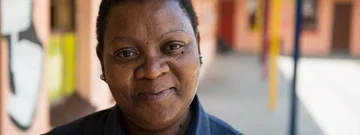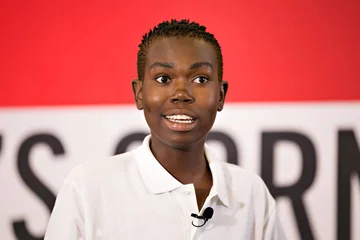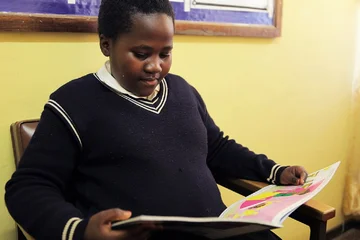“It’s time all the sectors of society take a stand against violence on children because what we are doing is not only hurting the children but hurting the future of South Africa,” said 15-year old Disema Sefume.
Disema’s boldness and ambition is inspiring. Spotted by a radio facilitator at the Children’s Radio Foundation, Disema joined the production team and helps present a show on issues affecting children.
We partnered with the Children’s Radio Foundation to bring issues relating to sexual reproductive health to the fore. Each week children between 12 and 18 years of age research, produce and present an hour long talk show that covers issues such as gender- based violence, sex and teen pregnancy.
Disema is one of thousands of children living in the remote village of QwaQwa in the Free State, South Africa, where poverty and unemployment are rife. Still, Disema is determined to lift himself and his family out of poverty and to bring about economic change not only to his village but South Africa too.
At home, Disema is the youngest of three boys. His dad died when he was very young and when his mother passed away in 2009 he moved in with his grandmother whom he describes as a ‘wow’ woman.
“My grandmother is wow. She is very close to my heart. She is proud of me being on radio and says I should use the opportunity to change lives, and I have. Sometimes children from my school ask me for advice and it makes me feel like I am doing something positive”.
Disema is one of 15 teenagers part of our Adolescent Sexual and Reproductive Health Rights (ASRHR) programme.We trained them to produce eight radio shows for QwaQwa Radio on the topic of sexual and reproductive health.
In addition, we work with 30 schools in the Free State, insisting on the acknowledgement of children’s rights to Adolescent’s Sexual and Reproductive Health.We train govern- ing bodies, school management teams and parents.
Parents in particular are the most important source of sexual health and knowledge and so we discussed their roles in depth with them. We recognised that there is a significant lack of youth services in general in South Africa and approached the Department of Education, the Department of Health and the Department of Social Development with ideas on how best to coordinate our efforts in bridging this gap.
Our ASRHR services even extends to migrant teenagers in Gauteng and Mpumalanga.
All adolescents in South Africa are entitled to grow up healthy, enjoying long-term good health. Help us by committing your donation TODAY!


